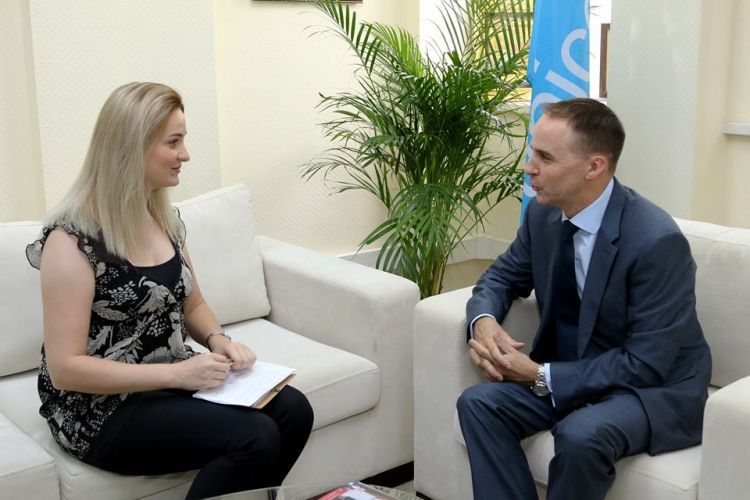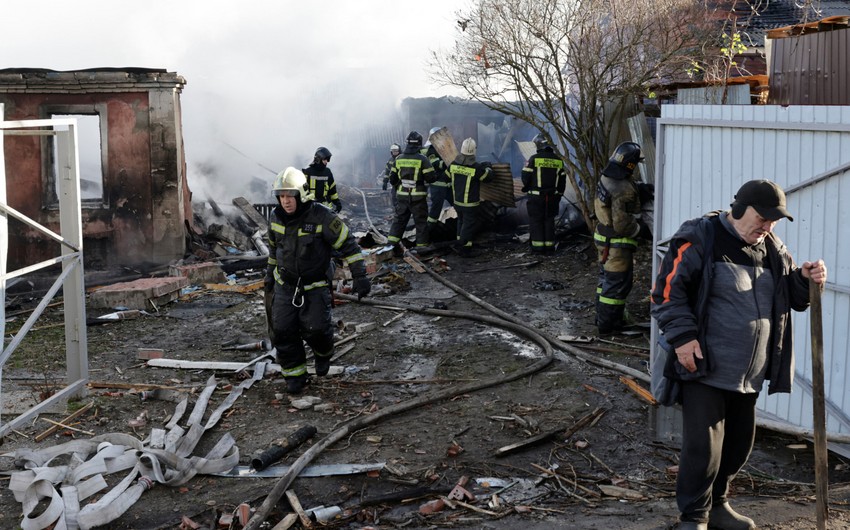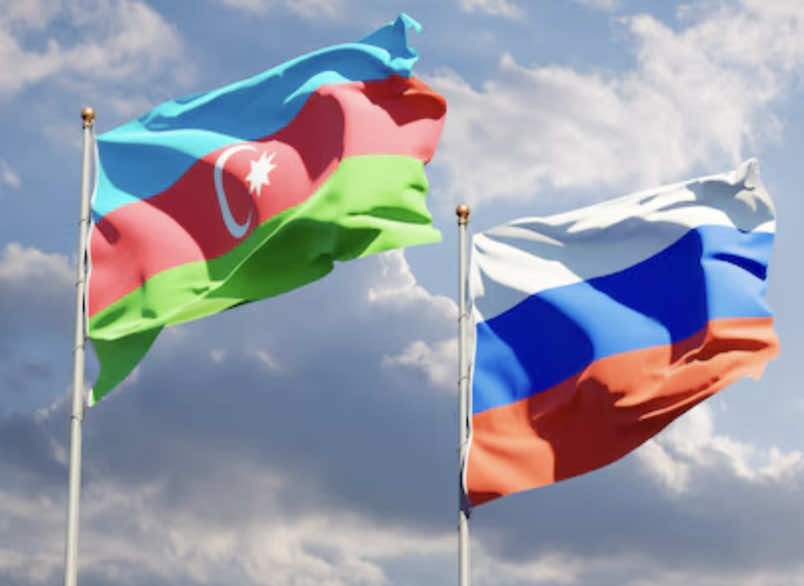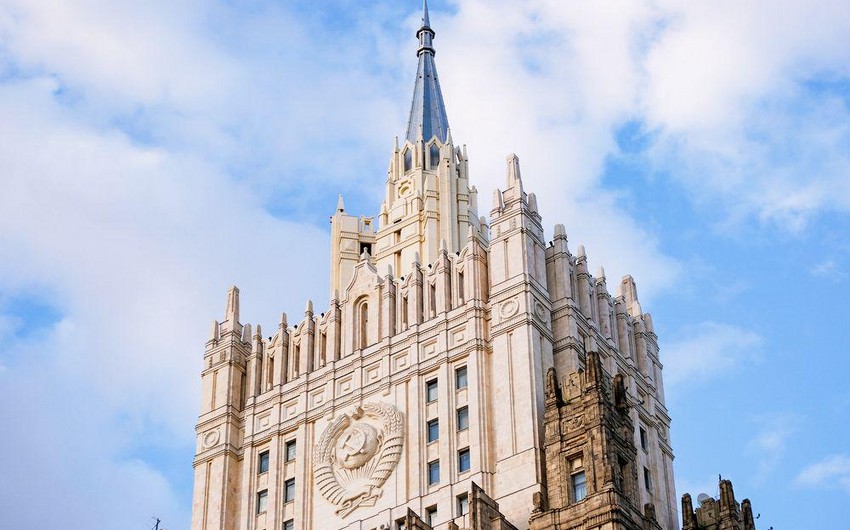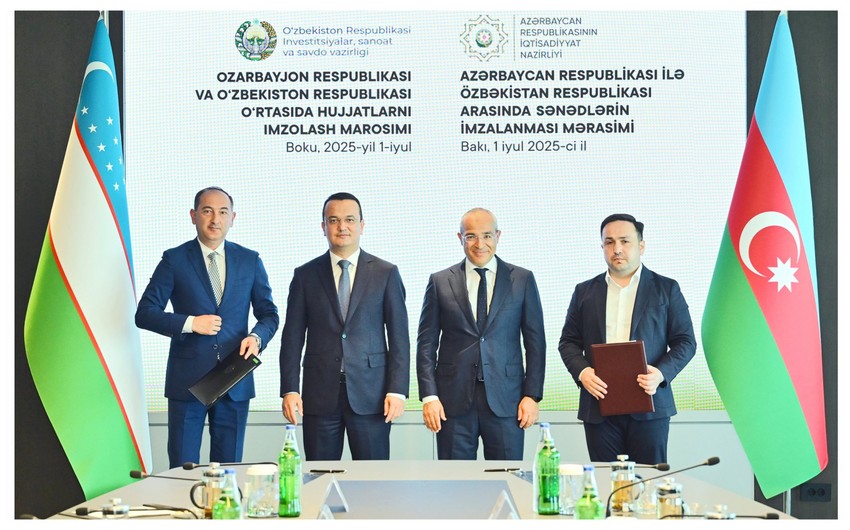It is two years since Edward Carwardine was appointed as the UNICEF Representative to Azerbaijan. In his interview with Eurasia Diary, he commented on the impacts of wars on the most vulnerable segment of the population – children.
Edward Carwardine: It’s been a very fulfilling two years that I have been here in Azerbaijan. I think what’s been particularly exciting for me is to have the chance to meet with so many children and young people around the country; who are so full of energy and are so determined to get the best from their lives. Of course UNICEF works very much with vulnerable children in the society, children with disabilities, handicapped children, children without families, with children living in conflict affected areas and also with the young people who’ve experienced hard lessons. I think I really feel confident that Azerbaijan has a great future ahead of it because these young people are determined to make a contribution but what they need of course is our contribution, our support and our collective assistance to grant them a chance to implement their full potential.
Speaking about positive changes, I have seen a lot of new programs established in Azerbaijan in the last years. We have to admit that the situation with children is getting better and better all the time. Moreover, we’ve seen of huge reductions in poverty rate. There are more healthy children in recent times. The health conditions of children have improved over the years but there are still challenges to be addressed. I reckon for UNICEF some of those challenges are affecting handicapped children who still don’t have opportunities to try and exercise the balance in society by being able to go to school or whether it’s by being unable to take part in activities in their communities and come out of their homes. On other hand, we still see challenges for young girls who’ve told me that they don’t feel they are able to really participate fully in the lives of their community. They want to have that opportunity.
I see this situation in the regions but I think it’s an issue across the entire country and the capital as well. We noted that there are still families who are still struggling financially. Families where only one of the parents is left of whom is usually the mother; the children will find life really difficult but we support those families, not just financially but by helping children so that they are able to go to school and they are cared after to fulfill their potential. I think this focus on the vulnerable population in the country is important for these families and for the children. It’s also important for the country as a whole because when we support those families, when we create employment for these children we know that later when those children become adults will be able to play a much more constructive and positive role in the life of Azerbaijan. That has a long term benefit for the country in terms of social development and economic development.
Eurasia Diary: Could you tell us more about cooperation between UNICEF and government structures and of course with NGOs and civil societies?
Edward Carwardine: UNICEF as in other countries works very closely with government. We design our projects and activities by collaboration with the key government Ministries and that’s exactly what we do here in Azerbaijan. I think we have enjoyed a good relationship with our partners in government and I think we have a common vision which is aimed on investment in children and in youth respectively. As the president of Azerbaijan said, citizens of Azerbaijan are regarded as the precious assets of this country. Taking this into account, we together with state bodies should effectively design projects and implement them.
It should be admitted, that the non-governmental sectors and civil society in Azerbaijan play an important role in this process. Actually, they often play roles within the community. They are in the districts, they are in the villages and they really are the connection between the work that we try to develop nationally and people who need to benefit from that support down the community level. Therefore we cooperate very closely with International Eurasia Press Fund (IEPF) because it’s very good at implementing partner of ours when we are working with bigger organizations like the National Youth Foundation for example. We need to find ways that we can insure that the work that we are trying to do reaches out to as many children as possible.
Eurasia Diary: Why it is important for UNCEF to involve the youth in the project?
Edward Carwardine: In Azerbaijan young people make up about one third of the population and that’s incredible force for potential, positive contributions that can be made to the life of the country. I really believe that young people are of course going to be the adults of the future they are going to be decision makers at their family level or whether its their local government and the private sector. Young people are going to be the group that designs success of this country in years to come and so that’s why it is important we invest in those people today. We create opportunities for young people to become engaged in decision making so that they feel that they can express their views and to share their ideas and to have receptive audience particularly in form of government. In that way we find that sometimes the challenges they face, the issues that matter to them can be addressed more effectively by having the dialogue between young people and decision makers. Therefore, all of our work goes to investing in young people’s skills to be effective in those discussions to build their confidence and to build their life skills. Also it’s to enable them to design projects and programs themselves and also to take responsibilities and sense of ownership for those activities .That’s important for when they grow older because we want young people to feel that they do have a responsibility, they do have a contribution to make and most importantly they can be part of the decision structures that Azerbaijan has.
Eurasia Diary: How does UNICEF promote SDGs in Azerbaijan particularly among youth?
Edward Carwardine: Well the Sustainable Development Agenda of course is now the global agenda for all countries. I think it"s an important area because its recognized that we have to be looking always to the future and what we do today has to last for generations to come. Additionally with young people, they are the people who are going to take things forward. They are going to be the group in the population that makes decisions as adults that makes choices that will benefits hopefully future generations children still to come. Therefore involving young people in the sustainable development Agenda as you say SDGs as we call them, it is important because I think it has two particular benefits. One is by listening to young people and understanding their concerns where they see needs. By doing this we come to a decision today that will have positive impact on them. One example, is a lot of youths in Azerbaijan are concerned with the environment, about the space in where they live and improvements in the environment. They want to see a healthier place to live, a healthier country. A country where the environment is better protected whether it’s the seas or whether it’s the country side. By listening to those concerns we can help make decisions today that address those issues. At the same time by involving young people in those discussions we help them to build their our interests; we help to build their commitment so that when they grow older and when they become parents , as they become teachers and as they become the next political leaders of the country they will be taking these issues seriously. That’s how we see sustainability. We see the benefits continuing from generation to generation and that’s really the positive direction that we want to move in.
Eurasia Diary: As we know that wars and conflicts affect mostly children because they are part of the most vulnerable population. How can you evaluate the situation in this sphere in Azerbaijan?
Edward Carwardine: I think the thing that frustrates me about conflicts is that they are created by adults but the worst impact is always on children and I have worked in many countries where there were conflicts. I’ve seen the first hand impact it has on children. It affects their education, it affects their family life, and it prevents some from taking patterns simple activities that children elsewhere in the world do all the time i.e. taking part in sport and recreation being able to move around safely. Above all it has psychological impact on children and we know that in Azerbaijan and in areas that has been affected by the conflict, young people have felt that very strongly. The course of concern is that if it is allowed to continue, it actually shapes the way young people think and the way they behave as they grow older and unfortunately it’s not in a positive way. Therefore, this is why in some of the districts which were affected by conflict here in Azerbaijan we have been working specifically with young people to create more positive, constructive ways in which they can be active in their communities. There is a very exciting project which involves IEPF which is called Azerbaijan Youth Advocacy Program which brings young people together in these districts to identify activities that they can lead to discuss those activities with local administration and design a plan of work that can get implemented. We have also seen really exciting projects. I went recently to the new 3D Cinema in Tartar; a book club in Barda where young people come together after school and they read and discuss issues together; to Goranboy to this wonderful new sport facility, sport ground the young people helped to design an put together themselves. Here young people can come together safely and take part in sporting activities and recreation for girls as well as boys. I think enabling young people in these difficult circumstances to have a positive outlet for their energy, to feel that there is something constructive that they can do has a long term impact on their psychological state. I think it helps them really to find opportunities in life but at the end of the day the adults has to stop the conflict. It’s their responsibility to find a peaceful solution wherever is in the world, that there may be a conflict taking place.
Eurasia Diary: The last question will be about the World Breastfeeding Week initiated by UNICEF. Could you tell us more about this wonderful initiative?
Edward Carwardine: Well every August around the world the first week of August is for breastfeeding week. It involves UNICEF also the World Health Organization and here in Azerbaijan we are really promoting the importance of breastfeeding. Milk breast feeding is the best start a newly born baby can have in life. If as a mother breastfeed your child, just breast milk for the first six months it provides enormous health benefits. It helps the child’s physical development, brain development it also have positive health benefits for the mother as well and it really is the best cost effective, straight forward way of feeding the child in those critical first six months.
We want more women in Azerbaijan to breastfeed wherever they may be safely but they also with dignity whether they are in a shopping mall, whether they are restaurant, whether they are in a place to work or they are at home. So our campaign in this week is promoting through the stories of the women themselves mothers talking about breast feeding but also fathers talking about how they’ve seen the positive impact of seeing their child being breast fed. I think when you hear those personal stories and you see the joy and the happiness of the parents and when you see the healthy child sitting there as well you just know that breast feeding is the best start to life. The more we can do it to promote and help mothers to do it the better it is for everyone.

